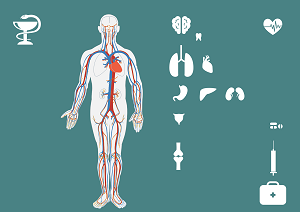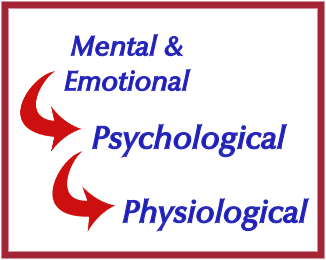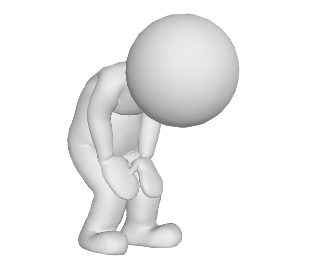
Stress – It’s About Your Body!
Stress is just a state of mind . . . right?
No, Sir!
Sorry if I’m breaking the news.
The majority of stressed individuals do not realize this:
A person’s natural stress response is mainly a physiological event.
Stress Affects Your Body!
This means that the effects of stress have never been limited to our minds.
As the graphic shows, when a person is stressed, all parts of their body experience it. Vector graphic by Freepik
 Stress is affecting your body, whether or not you are aware of it.
Stress is affecting your body, whether or not you are aware of it.
For decades, health professionals have been attributing a general state of ill health to stress. They have urged the public to seek ways to manage stress.
It’s a little scary: A person who experiences chronic stress over several years runs a much higher risk of deteriorating health conditions.
 A common example of this is high blood pressure. Graphic by Freepik
A common example of this is high blood pressure. Graphic by Freepik
Another alarming study has revealed that a heightened stress level over a period of time causes memory loss and brain shrinkage!
Bottom line: Stress — It’s about your body. If you want to be physically healthier, then you must understand how stress affects your body.
The Cycle of Stress
Scientists have observed how stress cycles through stages. This stress model shows how it progresses to the physiological state.

1st Phase: Mental and Emotional Triggers A person perceives an event, situation, action or idea as negative and stressful.
2nd Phase: Psychological If the person feels unequipped to handle the situation or continues thinking in a negative or exaggerated way, he experiences an ongoing state of psychological stress.
3rd Phase: Physiological Stress or “Fight or Flight” Response: Unmitigated psychological stress often leads to actual, physiological stress. Graphic by Stress Buffer
When the instinctual “fight or flight” response comes into play, a person feels an immediate surge of adrenaline. As a result, their speed, strength, and stamina temporarily increase.
The nervous tension causes changes in the body. A person’s breathing rate and pulse rate also increase in preparation for sudden, intense physical activity. An example is running away from a real, physical danger.
When the perceived threat or danger finally passes, the stress normally abates.
In any case, stress affects your body.
Then and now . . .
In pre-modern civilization, thousands of years ago, the instinctual “fight or flight” response was essential for our hunter-gatherer ancestors. They had to battle wild animals and each other.
Scientists today believe that stress adaptation evolved from the dilemma of our ancestors living in a threatening and dangerous environment. The body and mind rise to the occasion. Physical and mental stress adapt to the level of actual or perceived danger.
Is Stress Affecting Your Body?
23 Signs and Symptoms of Stress: Watch Out!
Do you experience any of these PHYSICAL SYMPTOMS:
1. Inexplicable exhaustion or fatigue
2. Acute headaches that have a tendency to disrupt work or chores at home
3. Shallow chest breathing
4. Increased heart rate even when not performing strenuous or challenging physical activities
5. Minor muscular pain
6. Twitches
7. Facial tics
8. Hand and arm tremors
9. A general feeling of nervousness and anxiety
10. Insomnia
11. Oversleeping
12. Inexplicable perspiring of the hands and feet
13. Turning to different substances such as caffeine, alcohol, nicotine and even recreational drugs
14. Shallow chest breathing very common
15. Minor muscular pain
16. Facial tics
Moderate and extreme stress often manifests as these MENTAL SYMPTOMS:
17. Short temper
18. Inexplicable mood swings
19. Feeling isolated and helpless
20. Short-term memory problems
21. A general decrease in work productivity
22. Lowered sexual desire
The body doesn’t lie. If you are experiencing any of the common physical or mental symptoms of stress, your body is sending you a signal to become aware and make some adjustments.
In this blog, we discuss natural ways you can relieve your stress, even eliminate it, for a healthier, more enjoyable life, both mentally and physically.
What about Psychological Stress?
The psychological signs of stress often manifest after long periods of continual stress. These signs arise as the mind is trying to escape the stressful situation in any way it can.

Psychological stress is one of the main reasons that stressed individuals are often less productive in the office.
Their minds are virtually exhausted from the prolonged stress response. Their thought patterns are distracting them from focusing on the task-at-hand. Vector graphic by Freepik
If they are taking courses as well, as is common in continual workplace and professional development, the new learning can seem overwhelming. Then stress surmounts, just like back in the school days.
A Common Problem?
How severe are stress-related physiological symptoms in the general population?
In the United States alone, seventy-five percent to 90% of all doctor’s office visits are for stress-related ailments and complaints.
In another recent study, 1 in 6 United States adults reported taking a stress-related drug, such as a sedative or antidepressant.
That’s 40 million sufferers attempting to manage their symptoms with medication.
Doctors attribute a multitude of ailments to stress. Whether triggered by constant worry, nervous tension, work and responsibility pressures, or any other trigger, the inevitable outcome is that stress affects the body.
Can you medicate your stress away? Or just the current physical symptom? Is medication a solution or a temporary comfort cushion?
Caution: Please be aware that the symptoms described in this article may be signs of health conditions that require medical attention. Consulting your physician is your best option if you experience physical symptoms, such as racing heart.
The Takeaway:
Stress is a natural response to a real or perceived danger. It starts with an emotional and mental state. If not abated, over time it develops into a psychological problem and then a physiological manifestation. People finally suspect that stress is affecting the body when the symptoms become apparent. Then they often turn to medications for a “quick fix”.
Whatever you do, don’t ignore these symptoms. Read on in our blog for the tips, tricks, and techniques people use to control stress and not let it affect their health.
What Do You Think?
Is ongoing medication the best way to deal with a natural response?
We welcome your comments in the box below
10 Stress Habits and Alternatives!
If not, click here



After looking over a number of the blog articles on your web page, I truly like your technique of blogging. I added it to my bookmark website list and will be checking back in the near future. Please visit my web site too and tell me how you feel.
Aw, this was a really good post. Taking the time and actual effort to generate a great article… but what can I say… I hesitate a lot and don’t seem to get nearly anything done.
Nice post. I learn something totally new and challenging on websites I stumbleupon every day. It’s always exciting to read through content from other authors and practice a little something from other websites.
You are so interesting! I don’t believe I’ve truly read a single thing like that before. So good to discover someone with unique thoughts on this subject. Seriously.. thank you for starting this up. This web site is something that’s needed on the web, someone with a bit of originality!
Everyone loves it when individuals get together and share opinions. Great website, continue the good work!
A motivating discussion is worth comment. There’s no doubt that that you ought to publish more on this issue, it may not be a taboo matter but typically people don’t speak about these topics. To the next! Kind regards.
That is a good tip particularly to those fresh to the blogosphere. Short but very precise info… Thanks for sharing this one. A must read article.
An impressive share! I have just forwarded this onto a coworker who was doing a little homework on this. And he in fact ordered me dinner due to the fact that I stumbled upon it for him… lol. So let me reword this…. Thank YOU for the meal!! But yeah, thanks for spending the time to discuss this issue here on your web page.
Simply desire to say your article is as amazing.
The clarity in your post is just nice and
i can assume you are an expert on this subject.
Well with your permission let me to grab your RSS feed to keep updated with forthcoming post.
Thanks a million and please continue the enjoyable work.
It’s hard to find knowledgeable people in this particular subject, however, you sound like you know what you’re talking about! Thanks